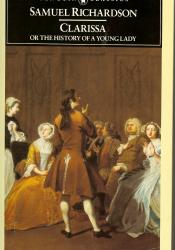"Clarissa" by Samuel Richardson
Samuel Richardson (1689-1761) was an English novelist that was apprenticed to a printer and later on opened his own printing shop in London. Richardson became known as a gifted epistolary writer and wrote a volume of model letters that appeared as Familiar Letters (1741). His continued work resulted in the publication of the novel Pamela; or Virtue Rewarded (2 vol., 1740), Clarissa; or the History of a Young Lady (7 vol., 1747–48), and History of Sir Charles Grandison (7 vol., 1753–54). Clarissa was known as a huge success when it first appeared in 1747, and it was translated into French and German. In the book Passion and Virtue: Essays on the Novels of Samuel Richardson by David Blewett, he describes Richardson's Clarissa as a portrayal of "... two vigorously competing world-views of his time, Hobbism, which percieves a materialistic universe based on restlessness, power, corruption, and self-interest, and Christian Platonism, which assumes the universe to be spiritually informed" (93). In addition, Gordon Fulton mentions in his book Styles of Meaning and Meanings of Style in Richardon's Clarrisa, how the novel encourages people to critique the existing ideologies, the dynamic of courtship, and the concept of seduction. Richardon also intended for his work to help readers decide on how they were going to act and/or think in different situations.
Fulton, Gordon. Styles of Meaning and Meanings of Style in Richardson's Clarissa, McGill-Queen's University Press, 1999. ProQuest Ebook Central, https://ebookcentral-proquest-com.pointloma.idm.oclc.org/lib/pointloma-e....
Passion and Virtue : Essays on the Novels of Samuel Richardson, edited by David Blewett, University of Toronto Press, 2001. ProQuest Ebook Central, https://ebookcentral-proquest-com.pointloma.idm.oclc.org/lib/pointloma-e....
“Richardson, Samuel.” Funk & Wagnalls New World Encyclopedia, Jan. 2018, p. 1; EBSCOhost, search.ebscohost.com/login.aspx?direct=true&db=funk&AN=ri045700&site=ehost-live.

